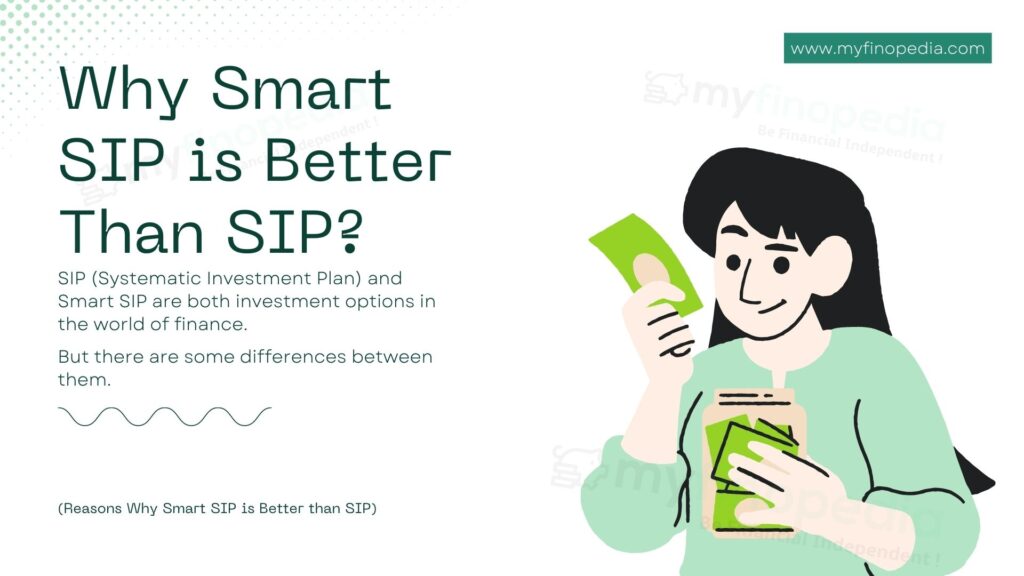Before discussing why Smart SIP is better than SIP, let’s first define these terms:-
SIP (Systematic Investment Plan) and Smart SIP are both investment options in the world of finance, but there are some differences between them.
SIP is a simple and popular investment option that allows investors to invest a fixed amount at regular intervals (usually monthly) in a mutual fund. The main advantage of SIP is that it enables investors to invest small amounts of money regularly, which can help to reduce the impact of market volatility over time. In addition, it can help to instill discipline and consistency in the investment process.
Smart SIP, on the other hand, is a relatively new concept in the world of finance. It is an advanced version of SIP that uses algorithms and technology to automatically adjust the investment amount based on market conditions. This means that if the market is doing well, the investment amount will be higher, and if the market is down, the investment amount will be lower.
In other words, Systematic Investment Plan is a type of investment strategy where investors regularly invest a fixed amount of money in a mutual fund or exchange-traded fund (ETF) at fixed intervals, typically on a monthly basis. The idea behind SIP is to encourage regular and disciplined investment in the market over a longer period of time, which can help to reduce the impact of market volatility and potentially lead to higher returns.
On the other hand, Smart SIP, on the other hand, is an advanced version of SIP that uses algorithms and technology to automatically adjust the investment amount based on market conditions. The goal of Smart SIP is to optimize returns by investing more when the market is expected to perform well and reducing the investment when the market is expected to perform poorly. It is designed to be more dynamic and responsive to changing market conditions than traditional SIP.
Reasons why smart SIP is better than SIP:-
It’s worth noting that the specific features and benefits of each investment option can vary depending on the specific mutual fund or ETF being invested in and the market conditions at any given time. Therefore, it’s important to conduct thorough research and seek professional advice before making any investment decisions.
Here are some reasons why SIP may be considered better than Smart SIP in certain circumstances:-
- Simplicity: SIP is a straightforward investment option that is easy to understand and implement. Investors can determine the amount they want to invest at regular intervals and stick to it over the long term. Smart SIP, on the other hand, can be more complex and may require a higher level of understanding of investment strategies and technology.
- Consistency: SIP encourages regular and consistent investment over the long term. Since the investment amount remains the same, investors are more likely to stick to their investment plans and avoid impulsive decisions based on market conditions.
- Lower Costs: SIP typically involves investing in mutual funds or ETFs with lower expense ratios. Smart SIP, on the other hand, may require more advanced investment products or technology, which can come with higher costs.
- Reduced Risks: SIP is a relatively low-risk investment option that can help reduce the impact of market volatility over the long term. Smart SIP, while designed to optimize returns, may also carry higher risks due to the dynamic nature of investment amount adjustments.
- Predictability: Since the investment amount remains the same, SIP can offer a more predictable return potential over the long term, which can be beneficial for investors who prefer a more stable investment option.
Here is a table summarizing some of the key differences between SIP and Smart SIP in finance:-
| Feature | SIP | Smart SIP |
| Investment Strategy | Fixed amount invested at regular intervals | Investment amount adjusted based on market conditions |
| Investment Amount | Fixed amount determined by the investor | Varies based on market conditions and algorithm |
| Frequency | Regular intervals, typically monthly | Regular intervals, typically monthly |
| Investment Discipline | Encourages regular and disciplined investment over a long period | Encourages regular and disciplined investment, but adjusts investment amount based on market conditions |
| Responsiveness to Market Conditions | Less responsive to market conditions | More responsive to market conditions |
| Return Potential | Potentially higher returns over the long term through disciplined investment | Potentially higher returns through optimization of investment amount based on market conditions |
| Risk | Can be impacted by market volatility | Can potentially reduce the impact of market volatility through dynamic investment management |
In summary, SIP is a traditional investment option that involves investing a fixed amount at regular intervals, whereas Smart SIP is an advanced version of SIP that uses technology and algorithms to adjust the investment amount based on market conditions, with the potential to offer better returns over time. It’s important to note that Smart SIP can be a more complicated and dynamic investing alternative than regular SIP, and may necessitate a deeper understanding of investment methods and technology. Before making any investment decisions, as with any other, it is critical to perform extensive study and get competent guidance.






